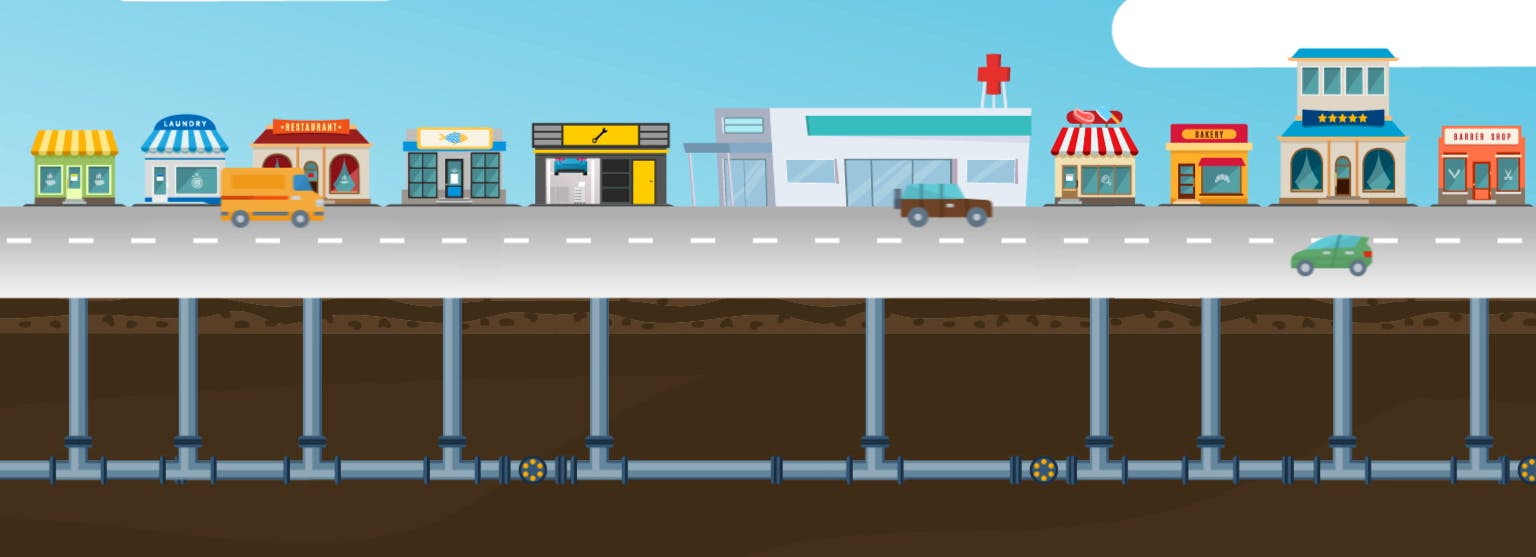FAQs
- Chemicals – special chemicals are added to the sewer pipes to keep the trade waste from breaking down and releasing toxic and corrosive gases and odours as it travels to the sewage treatment plant.
- Cleaning – extra monitoring, CCTV inspections and cleaning of the sewer pipes to identify and remove the build-up of fatty masses (called ‘fatbergs’) that are caused when dissolved fats, grease and oils that cool and solidify in the pipes, and often leading to blockages, odours and sewage overflows.
- Electricity - when higher-strength trade waste mixes with normal domestic waste at the sewage treatment plant, it requires a much longer treatment process and higher energy to break it down, which greatly increases electricity costs.
Why does Unitywater charge for trade waste?
Our network is designed to transport and treat domestic (household) wastewater. Trade waste discharge adds extra quantity and severity of wastewater to our network, increasing the costs to transport, treat and monitor.
Typically, trade waste contains substances that can damage our environment and sewerage infrastructure, which means it is more expensive to treat before it can be safely released into our waterways.
Currently, Unitywater charges most Trade Waste customers an annual permit fee. This fee contributes to the costs of treating trade waste and covers the cost of monitoring customers’ compliance with trade waste permit conditions.
What impact can trade waste have on the environment?
Trade waste is liquid waste generated from commercial and industrial businesses that goes into the sewerage system. It can have much higher levels of fats, oils, grease, food scraps, chemicals, acids and other toxic contaminants than household waste.
Trade waste requires a higher level of treatment to ensure the sewer network remains free from blockages and overflows. Effective treatment of trade waste helps keep our communities and environment healthy.
Businesses who generate trade waste are required to have a permit for the treatment of their waste before it reaches our waterways.
Trade waste requires extra and more-costly treatment processes over and above the normal treatment of domestic household sewage. The main ones include
Do I need a trade waste permit?
If you own a business which generates trade waste, you are required under the Water Supply (Safety and Reliability) Act 2008 to apply to Unitywater for approval to discharge your trade waste to the sewerage network. You are required to comply with all terms and conditions stated on your trade waste approval.
It is the responsibility of the trade waste generator (generally the business owner) to ensure they have a trade waste permit in place.
If you are not sure if you are in this category, please email tradewaste@unitywater.com for more information.
What does my Trade Waste Permit cover?
Currently, Unitywater charges most Trade Waste customers an annual permit fee. This fee contributes to the costs of treating trade waste and covers the cost of monitoring customers’ compliance with trade waste permit conditions.
All water authorities in Queensland, including Unitywater, are legally required to have a permitting system in place to assess and approve trade waste discharge to the sewerage network. Unitywater trade waste fees cover the administration of trade waste permitting required under the Water Supply (Safety and Reliability) 2008.
Did Unitywater talk to customers about changing prices?
From April 2022, Unitywater met with industry representatives and business associations to discuss upcoming changes and invite feedback. The conversations with industry representatives were instrumental in making sure we understood the current business climate and challenges.
In July and August 2022 Unitywater approached all trade waste customers by email, they were invited to nominate to be part of a Customer Reference Group. We were thrilled to have 12 members of our business community join us for two online meetings in September and October.
Themes and feedback from our stakeholder meetings and the Customer Reference Group meeting have been added to this page under 'questions' and 'ideas'.
What happens next?
We know that businesses are under pressure constantly and there is never a good time for a pricing change. That’s why we’re committed to doing what we can to minimise the changes for businesses.
Early next year (2023), we’ll send information to all our trade waste customers about their specific treatment tier, new pricing details and how this will be phased in.
Why do I have to pay for trade waste treatment when I have a pre-treatment device?
While your business may have a pre-treatment device (such as a grease arrestor, neutralising trap, dilution tanks, oil and water separators and lint screens) in place, these devices only capture solid or partially treat and prevent trade waste from entering the sewer system.
They do not stop dissolved oils, fats, chemicals and other contaminants still passing through and posing a serious risk to the sewerage system and treatment plants. This requires more expensive treatment, such as adding chemicals into the sewer to prevent odour and corrosion, and more cleaning of the pipes to prevent blockages and overflows.
What if I think my business has been placed in the wrong tier, or my business attributes change?
When we let you know your business’s treatment tier, we’ll have a formal review process in place that allows you to confirm that we have all the correct and up-to-date information about your business, and if necessary, have it re-assessed to ensure it is in the correct tier.
Details of this review process will be available on our website in February 2023. Before then, you can use our online treatment tier calculator to help understand what your tier could be.
